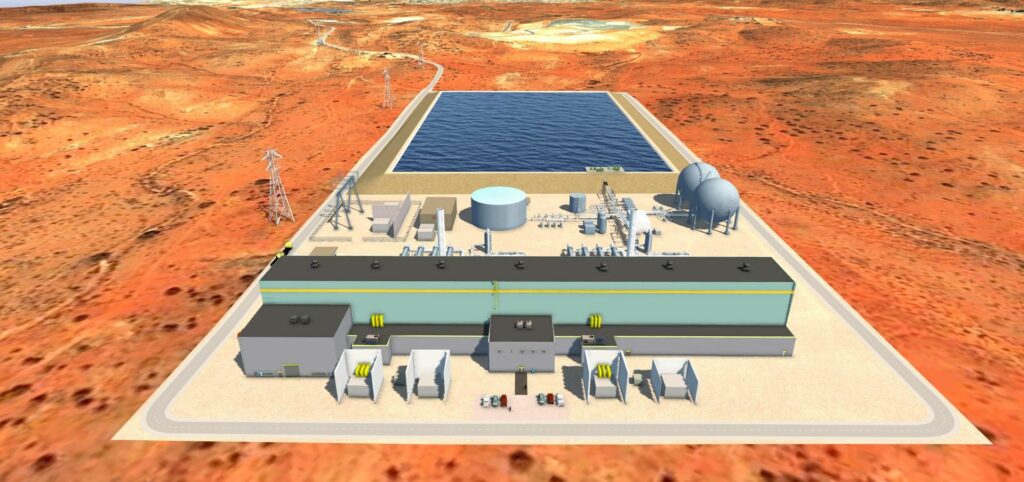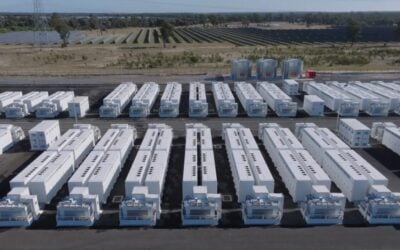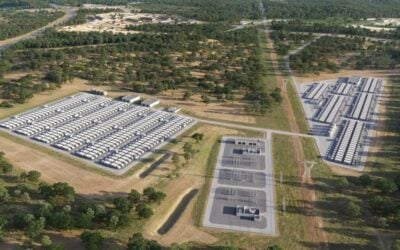
Three utility-scale long-duration energy storage (LDES) projects have been selected for contract awards in a tender held on behalf of the state of New South Wales, Australia.
The infrastructure projects, totalling 524MW of output and 4,192MWh of storage capacity, have been announced as winners in the latest round of solicitations hosted under the NSW Electricity Infrastructure Roadmap scheme.
Enjoy 12 months of exclusive analysis
- Regular insight and analysis of the industry’s biggest developments
- In-depth interviews with the industry’s leading figures
- Annual digital subscription to the PV Tech Power journal
- Discounts on Solar Media’s portfolio of events, in-person and virtual
They comprise two grid-scale lithium-ion (Li-ion) battery energy storage system (BESS) assets and one advanced compressed air energy storage (A-CAES) resource, scheme administrator AEMO Services said this morning.
It’s the third tender to be held by AEMO Services for the state this year, and specifically sought long-duration energy storage, along with new renewable energy capacity. Together with the three storage assets, 750MW of renewables, one wind farm (400MW) and one solar PV plant (350MW) were chosen.
The state roadmap aims to support the deployment of 12GW of new renewables, and 2GW of LDES by 2030. AEMO Services said the three tenders held already have resulted in AU$8.5 billion (US$5.7 billion) of new clean energy investment commitments.
While outside the scope of tenders, the Waratah Super Battery, currently under construction in the state, was also committed to through the roadmap. The 850MW/1,650MWh Super Battery has been instead handed a system integrity protection scheme (SIPS) contract – meaning its primary role is to act as a giant ‘shock absorber’ for the electricity network, helping to manage flows in the event of disruptions caused by things like lightning strikes.
‘Flexible financial security’ for generation, long-duration storage
Tenders will continue to be held biannually for the next decade, Paul Verschuer, executive general manager at AEMO Services said, adding that the tenders provide awarded projects, “with [the] flexible financial security they need to accelerate their completion”.
This is down to the state offering Long Term Energy Service Agreements (LTESAs), which AEMO Services has claimed are a “unique new financial instrument” reducing the risk inherent in investing in assets exposed to electricity pricing dynamics.
“From the strength of the response to the first year of our tender process, it’s clear that the insurance provided by the LTESA contract is working to address a key market risk that might otherwise delay or discourage investors from participating in the transition,” Verschuer said.
New South Wales’ electricity grid is connected to the National Electricity Market (NEM), as are Australia’s other major southern and eastern states. While the NEM was recently identified as among the most price-volatile in the world, meaning there’s a strong business case for battery storage to provide price arbitrage, it is also characterised by uncertainty of those revenues, which can make it hard to get upfront financing.
The winning projects are as follows:
| Project | Technology | Proponent | Output/capacity | Location |
| Silver City Energy Storage | Advanced compressed air energy storage | Hydrostor | 200MW/1,600MWh | Broken Hill |
| Goulburn River BESS | Lithium-ion BESS (part of hybrid power plant) | Lightsource Development Services Australia | 49MW/392MWh | Merriwa |
| Richmond Valley BESS | Lithium-ion BESS | Ark Energy Projects | 275MW/2,200MWh | Myrtle Creek |
| Uungula Wind Farm | Wind | Squadron Energy | 400MW | Twelve Mille |
| Culcairn Solar Farm | Solar PV | Neoen | 350MW | Culcairn |
A-CAES technology provider Hydrostor, which is self-developing the Silver City project in Broken Hill, NSW, recently also got a contract with network operator Transgrid for the 1,600MWh long-duration storage facility to provide 250MWh of reserve capacity that could be used as backup power should the local area suffer grid outages. The company has said previously that the project is expected to cost around AU$650 million and it will leverage some existing mining infrastructure already at the Broken Hill site to store compressed air underground.
Hydrostor CEO Curtis VanWalleghem said the LTESA award was a “vote of confidence” in both his company’s technology and the LDES asset class in general as a “key technology pathway for decarbonisation and grid reliability across Australia”.
“This provides a model for getting much-needed firming capacity into Australian electricity markets, and we applaud the innovative leadership shown by the NSW government and AEMO Services to support the development of clean and flexible power resources,” the CEO said.
Hydrostor’s is the first non-lithium technology to win one of these tenders, with AEMO Services’ inaugural long-duration and generation tender in 2022 awarding an LTESA to a 50MW/400MWh long-duration Li-ion project by German utility RWE.
AGL takes FID on 1GWh winner of previous round
Meanwhile, three Li-ion projects totalling 980MW/2,790MWh along with 95MW of virtual power plant (VPP) aggregated resources won AEMO Services’ most recent NSW tender, announced in November.
The proponent of one of those three projects, AGL – Australia’s biggest generator-retailer of electricity – said this morning that it has reached a Final Investment Decision (FID) on the 500MW, 2-hour duration (1,000MWh) BESS project.
AGL said this morning that the decision had been made to go ahead with the BESS at its Hunter Energy Hub complex. The hub is being planned as a mixed technology generation and storage facility which could combine hydrogen production with renewable energy generation, and battery storage.
It will be at the site of Liddell, a coal-fired power plant which shut down this year and which is owned by AGL. In addition to the LTESA with the NSW government, the Lidell BESS is being supported by an AU$35 million grant from the national Australian Renewable Energy Agency (ARENA).
Lidell was one of eight so-called ‘grid-forming’ energy storage projects adding up to 4.2GWh that ARENA chose to support with AU$176 million, as announced in December 2022. The grant is an incentive for Liddel and other projects to be equipped with advanced inverters that mean the battery assets can provide inertia, which helps keep the grid stable and was traditionally provided by thermal power plants.
AGL said the BESS would be funded off its balance sheet, using the company’s operating cash flows and existing debt facilities. Construction is expected to begin early next year.
Energy-Storage.news’ publisher Solar Media will host the 1st Energy Storage Summit Australia, on 21-22 May 2024 in Sydney, NSW. Featuring a packed programme of panels, presentations and fireside chats from industry leaders focusing on accelerating the market for energy storage across the country. For more information, go to the website.






